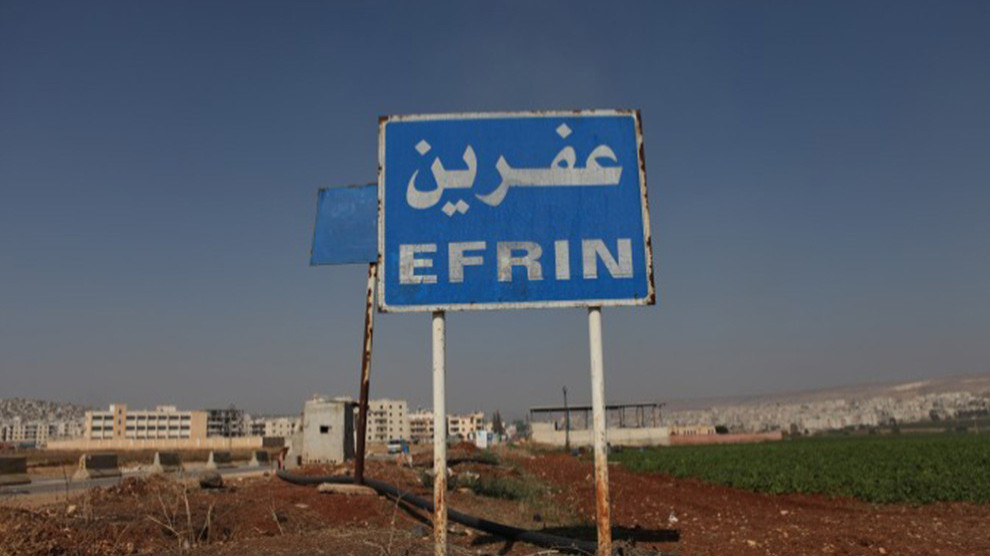Occupation forces attack villages in Afrin countryside
The Turkish state’s genocidal campaign seeking to invade North and East Syria together with jihadist mercenaries has continued since October 2019 in violation of international law.
The Turkish state’s genocidal campaign seeking to invade North and East Syria together with jihadist mercenaries has continued since October 2019 in violation of international law.

The occupant Turkish army and allied mercenaries have launched a wave of aggression on villages in the occupied Afrin territory.
According to reports from the ground, the attack targets the villages of Maranaz and Malikiya in the Shera district, and the villages of Aqiba, Soxanaka and the forested land in the Sherawa district.
The attacks by Turkey and its jihadist auxiliary forces in northern Syria have not abated, even in times of the coronavirus pandemic, and are mainly directed at residential areas and civil infrastructure. While civilian population suffers casualties, the power and water supply has collapsed in large parts of north-east Syria due to the targeted artillery attacks.
As part of worldwide measures to contain the spread of the coronavirus, UN Secretary-General António Guterres called for a global ceasefire on 23 March and called on the parties to the conflict to cease hostilities, saying; “End the sickness of war and fight the disease that is ravaging our world. It is time to put armed conflict on lockdown and focus together on the true fight of our lives. Silence the guns; stop the artillery; end the airstrikes. This is crucial.”
In Syria, the Syrian Democratic Forces (SDF) responded by declaring that they would follow the UN appeal in the autonomous region and calling on all other parties to the conflict to immediately observe a humanitarian ceasefire. But so far the other warring parties have ignored this outstretched hand.
Turkey is using the Corona pandemic to expand its zone of occupation in the midst of the crisis. Despite warnings that a Covid-19 outbreak in Syria would pose a deadly threat to 6.5 million internally displaced persons suffering the effects of nine years of war, and a renewed appeal by the UN that a cessation of fighting could help create the conditions for the provision of life-saving aid, Northern and Syria continue to be under attack.
In the cities of Serêkaniyê (Ras al-Ain) and Girê Spî (Tal Abyad), which have been included in the Turkish occupation zone in North-East Syria since October 2019, and in the self-governing areas along the Turkish-Syrian border, significant military activities of Turkey's jihadist proxy army ("Syrian National Army", SNA) are taking place.
Afrin has been under the occupation of the Turkish state and its mercenary allies for over two years now. The attacks of the Turkish state against Afrin began on 20 January 2018 and the invasion of the city was carried out on 18 March 2018. Since the invasion, war crimes have been systematically committed in the region. Almost every day, crimes such as the confiscation of property belonging to local people, kidnapping of civilians for ransom, torture or executions are carried out.
The occupation forces controlled by Ankara use the abductions to extort ransoms. This method has become a lucrative source of income. At least 500 cases of ransom handovers have been reported so far. Turkish-backed militias demand an equivalent of between 3,000 and 100,000 euros, depending on the ability of the victims' relatives to pay.
UN: War crimes and torture in Afrin
Last autumn, the UN Human Rights Council published a report on the situation in Syria, which also describes the devastating human rights situation in Afrin. The Council documented that the overall security conditions in Afrin and adjacent districts remained dire with armed factions having carved up the province into geographic zones of influence.
“As a result there is a general absence of rule of law and repeated incidents of kidnappings, torture, extortion and assassination. Victims were often of Kurdish origin as well as civilians perceived as being prosperous, including doctors, businessmen and merchants,” said the report.